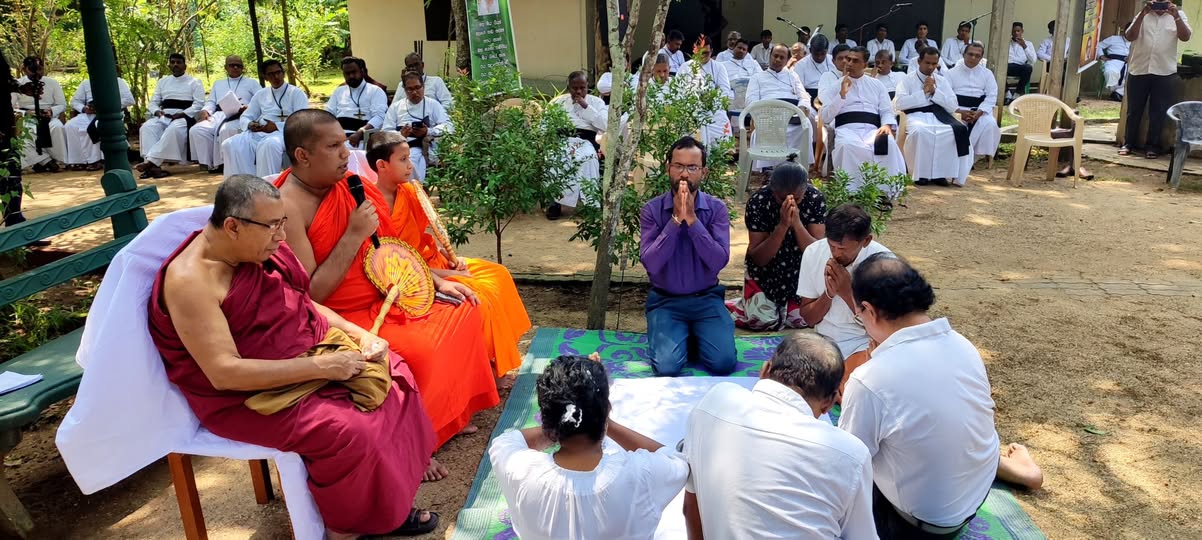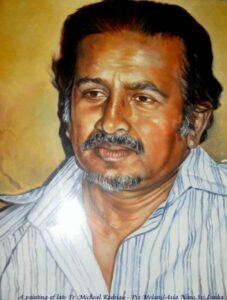Christians and Buddhists remember Father Mike, a martyr for the poor
The memory of the Oblate missionary, killed on 10 November 1987, lives on in Buttala, the village where he went to live to defend the rights of the poor. According to local Buddhist monks, older residents remember the light he brought to the village. One of his confreres, Father Shanil, calls on fellow members of the clergy to “reflect upon what prompted him to live that type of life” and follow his “living testimony” today.
Colombo (AsiaNews) – “Incarnation is not just a theological concept. Sacrifice for the people is not just a sermon. Father Michael taught it to us by being a living testimony”.
With these words, Christian groups, priests of the Oblates of Mary Immaculate, local religious, and non-Christians from the village of Buttala have recently remembered and commemorated the figure of Fr Michael Paul Rodrigo, a Catholic priest shot dead on 10 November 1987.
His testimony is extremely timely on the eve of the World Day of the Poor, which the Church will celebrate worldwide next Sunday, 16 November.
A missionary with the Oblates of Mary Immaculate, Father Mike was murdered in his home, known as Suba Seth Gedara, the “House of those who wish good”; for his work advocating for justice on behalf of the extremely poor people in Buttala, a village in the Uva-Monaragala area.
Living his ministry as a priest to the full, he chose to share his life with the most unfortunate and oppressed; he was not afraid to speak out against abuse and injustice, demonstrating “a new way of being Christian.”
Butalla was home to a large Buddhist population, but Father Michael offered extraordinary service to all without any religious discrimination.
The monks of the Buttala Purana Raja Maha Viharaya remembered this attitude, performing rituals and reciting the Pirith (a Buddhist prayer) in his memory.
“Although we did not know Father Michael personally, we know from the parents and elders of this village how much service he rendered to our people during his lifetime,” bringing “light to the village”, said the abbot.
“We met Father Mike when we were students at the National Seminary,” said Ajith Hadley Perera, who studied under Father Mike and is now a lay social activist.
“We learned from him. It was not in a classroom; it was through life. His life challenges us every day,” he told AsiaNews.
Father Mike defended farmers’ rights during the expropriation of their land by the Pelawatte Sugar Factory. This prompted death threats against him.
In 1987, Sri Lanka was reeling from widespread terror – a perfect time to silence his voice, as it was easy to attribute the murder to rebels or unknown gunmen.
He, however, decided not to abandon the poor. An unknown gunman shot him in the head through a window.
“That extremely valuable dedication gave our lives immense strength and power,” Ajith Hadley said.
Father Shanil, a member of the Oblates of Mary Immaculate, remembers that when his confrere, Father Mike, began his life at Suba Seth Gedara in Buttala, Buddhist-Christian dialogue or the “dialogue of life” were not common terms.
However, he took a courageous step in that direction. He did not simply limit himself to an intellectual exercise, which he was certainly capable of, debating doctrinal similarities and differences, but chose to live in a remote Buddhist village, sharing its daily hardships.
Together with Sisters Milburga and Benedicta and other volunteers, he organised health campaigns, reintegrated abandoned students into school, built Montessori facilities, started a library, trained shoeless nurses, and introduced traditional medicines made in the village.
For Father Shanil, “if we as priests and religious in Sri Lanka today wish to take a leaf out of the life and mission of Fr Mike, it is not as simple as doing the exact workload he was doing, for the sake of doing so. Rather, we must reflect upon what prompted him to live that type of life.”
He envisioned a Church deeply rooted in this land, sharing the hardships of its people – Catholics or Buddhists, Sinhalese or Tamils, truly working to improve their lives. This is what he called the “dialogue of life”.
“This vision of Fr. Mike remains a need of the time, even for many generations to come. That is, to continue a profound dialogue of life in this multi-religious and multi-ethnic country where the majority of people are still below the poverty line,” said Father Shanil.
By Melani Manel Perera
Published on the PIME Asia News website




